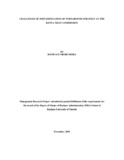| dc.description.abstract | During the 21st century, organizations will continue to experience discontinuous and abrupt
change. Every organization will be required to reinvent its strategy continuously, year after
year and make right angle turns quite often (Hemel, 2002). Since change has become a
constant, successful organizations will need to implement change continuously and this will
require development of organizational change competencies. Successful organizations will be
those that implement turnaround strategies successfully. The Kenya Meat Commission
(KMC) is one of these institutions that is yet to effectively manage challenges facing the
implementation of its turnaround strategy. The firm has failed to take off since its revival in
June 2006 and has continued to depend on government grants and loans. In spite of the
Government of Kenya investing Ksh, 1.9 billion in the restructuring efforts, KMC’s
performance has been below par (making losses amounting to Ksh313m and Ksh224m in
2007 and 2008 respectively and it has been operating at less than half its optimum capacity.
This study therefore sought to document the turnaround strategy at KMC and also to
determine the challenges faced in implementation of the turnaround strategy. The study
adopted a case study research design. The case study was chosen because it gave an in-depth
investigation of the key information on the implementation of turnaround strategy at KMC.
The informants were the Managing Commissioner, Finance Manager, Production Manager,
Sales and Marketing Manager, Livestock Manager, Human Resources and Administration
Manager, Engineering Manager, and the Procurement Manager. The researcher conducted
individual in-depth interviews (IDIS) that were guided by unstructured and open ended
questions for the key informants. The data was analyzed using content analysis technique
because it was qualitative in nature. Data was summarized and presented under thematic
areas in response to the objectives. The study found out that the KMC Management adopted a
number of strategies in order to turnaround the institution. These strategies included;
rehabilitation of machines and requisite infrastructure , operationalization of the institution,
drawing up of a management structure and manning levels in line with the business and
functions of the corporation, provision of funds by the government for the purchase of
livestock, recruitment of new staff, cost saving/cost management measures, opening new
markets, expanding sales of the company, appropriate costing of products, debt management
and reschedulement, implementation of result based financing programme , preparation of a
new strategic plan that is aligned to the company’s activities, objectives and vision 2030. The main challenges faced in the implementation of turnaround strategy at KMC were
ineffective leadership, frequent breakdowns of the machinery, cash flow problems, negative
culture/resistance to change, limited funds to undertake adequate marketing, lose of export
markets, poor planning especially on livestock off take programmes, slow adoption to
changing technology, non-involvement of stakeholders and lack of budget linkage to specific
strategic priority. | en |

